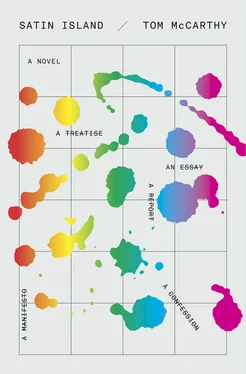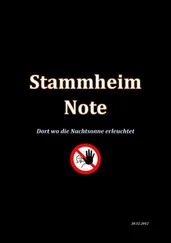11.1Sensational development in the skydiving murder case: the police (the following week’s news pages informed their readers) had arrested one of his pall-bearers. The suspect, the victim’s best friend, had been on the same dive. They’d been inseparable; the suspect had even been the best man at his wedding. No more details could be given at this point: the thing was presumably sub judice . There was, however, one more sentence tagged on at the end; a sentence that, while seemingly just factual and neutral, managed to imply a wealth of supposition. It announced that the dead parachutist’s wife, herself also a parachutist, was “helping police with their enquiries.” The insinuation, of course, was that she’d colluded with the pall-bearing best man — who, it would follow, was her lover. A love-triangle, elevated from the altar to the sky! I marked its various vectors on my walls: lines linking DP (Dead Parachutist) to BM (Best Man) to W (Wife); and each of these to H1 (Harness One), H2, H3; and SR (Storage Room) to AP (Aeroplane); BR1 (Bedroom One, the conjugal one) to BR2 (its adulterous counterpart)… It was more than just a triangle: it was a web, a tangle of competing sections, intersections, blind spots, unfolding like so many strands till now compressed and hidden in a parachute’s sealed bridle; lines that eventually converged, like cords descending from a canopy, on a single spot at my diagram’s base — a spot that represented, naturally, not love but death.
11.2A trip to Stockholm helped bring into focus a small insight I’d had into Madison, the workings of her mind. Each time I’d been abroad, she’d phoned me, full of lust and longing, to demand my swift return; yet, whenever I’d actually been with her, this lust and longing had been missing. We’d had sex, of course, but even then she’d given the impression of being absent, somewhere else. Each time we did it, I’d watch her face. Her eyes would remain closed for most of the encounter; then, as she approached her orgasm, they’d open. But that didn’t mean she’d look at me, or at anything else for that matter: as her eyelids slid up, the eyes themselves would roll up with them, and continue rolling after the lids had stopped, until their centres, those small circles of intelligence and colour that you think of as the apertures leading to what’s behind the eyes, to their owner’s being or essence or whatever, were almost completely occluded — just two small, gelatinous segments remaining, moons of pupil thumbnailed by the overlay of skin. Each time this happened (and it happened every time), I’d find myself transported back to Turin Airport: to that laptop screen on which her face had first appeared and then been frozen in mid-gesture. The expression was the same. It got so that I felt I was penetrating not her but rather, through her, that other moment: that long, stretched-out moment, its endless buffering. I would think, again, about the shroud, the not-Christ figure’s upturned eyes; and I’d remember Madison telling me that she, too, had visited that airport, back in 2001, and her not answering my question as to how this came about. The result, the upshot of this repeating cluster of associations, was that Turin, Torino-Caselle, took on over time a kind of sacred aspect: this airport, this slow-spinning hub, this thorn-crown of delay, became, for me, the site of a divine mystery. Approaching and re-entering it, crossing, time after time, its portal, I, too, would become lost in spasms of paralysis.
11.3In the basement next to me that week, Daniel was watching pretend zombies. They marched across his wall on one of those parades; lurching slowly through the streets, their heads lolling from side to side, their eyes, like Madison’s and the video-file’s fishes’, vacant. There were young ones, old ones, even children taking part. Some wore business clothes, some military uniforms, others firemen’s outfits, evening gowns, tracksuits, pyjamas. There were nurses, bridal couples, traffic wardens, fast-food restaurant workers, skateboarders, mothers with zombified babies, hospital patients, clowns. Some of these pretend zombies carried pretend brains, or hearts, or limbs, which they would gnaw at intermittently. Stewards in yellow jackets, themselves daubed in pretend blood, kept the procession to one side of the road, away from traffic. The odd mounted policeman could be seen as well. The pretend zombies lurched past offices and cafés, across traffic intersections, petrol-station forecourts, bridges, civic squares. What city’s that? I asked Daniel. What does it matter? he replied. They have zombie parades everywhere now.
11.4Then, after holding and questioning him for forty-eight hours, the police released the pall-bearing best man. They sprung him without charge, making it clear that they no longer thought he was in any way accountable for his friend’s death. In his place, though, they arrested a second member of the club. This one, also well-known to victim, wife, best friend and all, hadn’t been on the dive; but he’d had access to the room in which the rigs had all been stored. They also held and questioned him for two days — then released him, once more without making any kind of charge. Over the next two weeks they made four more arrests, each of which ended in an unconditional discharge. They arrested the club secretary; then a senior instructor; then the cleaner; then a member of the canteen staff. Eventually they stopped making arrests: presumably they’d run out of people to slap cuffs on. They started looking down the suicide route instead: exploring the possibility that the victim had sabotaged his own chute. This, too, proved a false trail: the man turned out to have been happy, and to have shown no melancholic tendencies. After this, the whole thing started going quiet; news pages and newspapers all dropped the story. To plug the gap this left in my life, I transferred my attention to the skydiving mysteries in Canada and Poland and New Zealand. Nobody in the media seemed to have noticed, or at least attributed any significance to, the fact that the episode, its variants, were appearing concurrently on three separate continents. This, too, excited me: that I alone was starting to pick up the outline of a set of permutations, to discern a morphology at work. I say “concurrently,” but in fact the overseas cases weren’t quite in kilter with the British one: they lagged slightly behind it, and one another. Nonetheless, a similar sequence was playing out in each: a flurry of arrests and speculation, then a dwindling away as all the trails turned cold.
11.5The Great Report. In Tristes Tropiques , Lévi-Strauss recounts how, after spending months on end among the Nambikwara, with no prospect of escape in sight (the rainy season, rivers flooded and un-navigable, all the perks he’d brought with him — food, wine, bottled water, cigarettes — consumed or traded off, clothes damp and rotten as the hut whose dripping walls and ceiling beat out the slow, metronomic rhythm of his days), bored out of his skull and starting to fall prey to what he later called a “mental disorder” that can afflict anthropologists, he started to compose an epic drama. For six days my hero wrote from morning till night on the back of sheets of paper containing his research notes. The drama’s plot involved a Roman emperor and his assassin, and a grand exploration of the themes of glory, power, nature and annihilation. I picture him writing it, cold and rheumatic on interminable afternoons. No, scratch that: what I actually picture is the paper that he writes it on: on one side, columns of Nambikwara words and phrases, transcriptions of tattoos, diagrams of the village’s huts’ layout, with attempts to correlate these with the tribe’s wider myth and kinship structures, which he’s extrapolated and laid out in graphs and tables — then, on the other side, the play. On one side, scientific, evidence-based research; on the other, epic art. If my Report had come to be completed, which side of the paper would it have been written on? More to the point: to which side does this not-Report you’re reading now, this offslew of the real, unwritten manuscript, belong? Perhaps to neither side, but to the middle: the damp, pulpy mass that forms the opaque body at whose outer limits, like two mirages, the others hover.
Читать дальше












